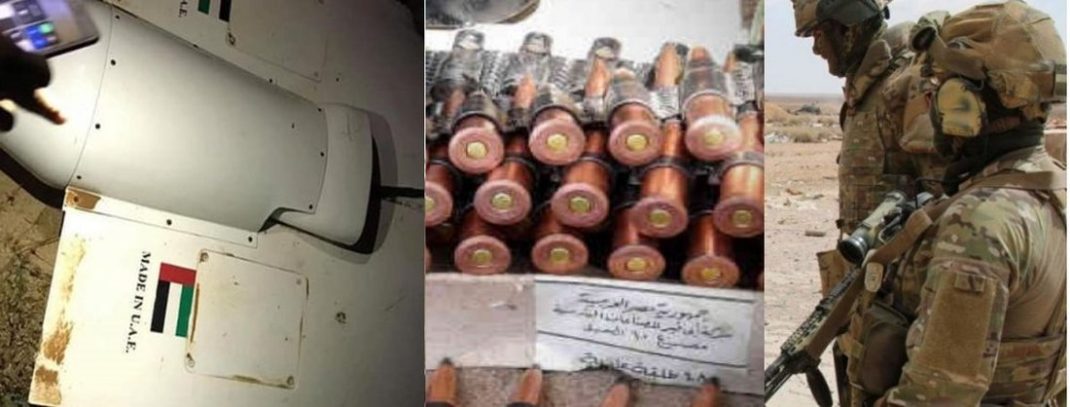
An Al Jazeera Arabic investigation has uncovered Egyptian, Russian and UAE arms support to Libya‘s renegade military commander Khalifa Haftar.
The commander has – since April 4 – waged a months-long offensive against the UN-recognised, Tripoli-based Government of National Accord (GNA).
The Point Blank investigative programme incorporated exclusive documents and interviews with GNA leaders who spoke about the complex workings of the three countries’ support for Haftar and his self-styled Libyan National Army (LNA).
According to GNA Interior Minister Fathi Bashaga, Haftar’s “biggest support lies in the fact that the [Haftar-controlled] eastern region directly borders Egypt,” making the border crossing with Egypt the main channel for military supplies.
The hour-long Arabic language documentary revealed the existence of secret Egyptian foreign ministry documents dating back to May 26, 2017, implicating Cairo in the facilitation of Sudanese militia deployment to Libya.
It also alluded to warnings by Chadian President Idriss Deby as to the threat posed by the Sudanese militia presence, which according to former Chadian Foreign Minister Ibrahim Hassan Taha, were deployed predominantly in southern Libya.
An Egyptian C-130 military cargo plane was also discovered to have undertaken regular trips to military bases in eastern Libya, the investigation revealed. These are believed to have used satellite jammers to avoid detection as they crossed into Libya territory.
Satellite images obtained by Point Blank, taken in mid-April, showed a large mobilisation of military vehicles in a camp near Salloum, Egypt, the main entry point into Libya.
A new road was also discovered, linking Othman military base in western Egypt to Tobruk, Libya.
A spokesperson for the Egyptian military did not respond to Point Blank‘s request for comment.
Meanwhile, a UN report in May concluded that Chinese-made Wing Loong II drones had likely been responsible for attacks outside Tripoli.
It went on to say the drones could have been operated by a third party, giving rise to speculation the UAE was involved.
Arms sanctions violations
Separately from the documentary, US media has in recent weeks reported on Russian mercenaries being deployed to the front lines to assist Haftar’s forces, which are currently unable to break through the GNA’s defences.
In its latest report, the UN said Jordan, Turkey, Sudan and the UAE had regularly violated the UN arms embargo on Libya since 2011.
Ankara supplied the GNA with Bayraktar TB2 drones at a cost of $5m each, a purchase government officials in Tripoli have justified as necessary to defend the city.
“We haven’t received any real support from any of our allies,” Khaled al-Meshri, president of the High Council of State of the GNA, told Al Jazeera.
“In the case of Turkey, we bought weapons legally and with the agreement of the GNA. But to receive free support or support contrary to UN resolutions … This did not happen.”
****
Sudan denies UN report it supplied Libya’s Haftar with paramilitaries
![]()
Sudan has denied a United Nations report alleging it sent paramilitaries to fight for Khalifa Haftar in Libya.
The confidential report, revealed by AFP earlier this week, appeared to confirm earlier reports by The New Arab‘s Arabic service accusing Sudanese General Mohammad Hamdan Dagalo of supplying the Libyan warlord with militiamen.
Dagalo, better known by his nickname Himedti, is the commander of Sudan’s paramilitary Rapid Support Forces (RSF) and a member of the country’s transitional sovereign council.
The confidential UN report, compiled by a panel of experts over a year, found that Jordan, the United Arab Emirates and Turkey had regularly violated a UN arms embargo imposed on Libya in 2011.
While Ankara did so by allegedly supplying military equipment ranging from armoured vehicles to drones to the UN-recognised government of Prime Minister Fayez al-Sarraj, Abu Dhabi and Amman are accused of violating the embargo in support of Haftar, a warlord regularly accused of rights violations who launched an offensive in April in a bid to seize Tripoli.
Delivered to the UN Security Council in late October, the report also alleged the presence of Chadian and Sudanese foreign fighters in the country.
According to the report, a thousand RSF troops were sent to the eastern city of Benghazi in July in order to protect oil infrastructure there while the main bulk of Haftar’s forces continued their assault on Tripoli in the country’s west.
Sudanese Armed Forces spokesman Brigadier General Aamer Mohamed al-Hasan rejected the claims on Saturday.
Speaking to Tiba TV, he called the claims “false rumours” and stated that the RSF works according to international and UN conventions.
“The Sudanese army is not a security company that can be rented out as claimed in this report,” Hasan said.
“These claims are part of a systematic maliciousness aimed against the Sudanese national institutions.”
Himedti’s RSF paramilitaries are also present in Yemen, where they fight against the Houthi rebels as part of the Saudi-led coalition.
The paramilitary group has been accused by rights groups of taking large sums from Saudi Arabia to recruit poor young men – and even children – from Sudan’s deprived Darfur region and neighbouring country Chad to serve in Yemen.
The RSF is an officialised offshoot of the Janjaweed militias, infamous for their role in the devastating Darfur conflict.
The International Criminal Court (ICC) has accused the regime of former President Omar al-Bashir, ousted earlier this year after months of popular protests, of recruiting, funding and organising the Janjaweed, which are widely accused of carrying out genocide, mass rape and other war crimes.
Under Himedti, the RSF has served as a border force designed to stop African migrants crossing the desert into Libya and Egypt and a counter-insurgency force battling with rebels in the country’s South Kordofan and Blue Nile conflict zones.
There the paramilitary force has been accused of human rights violations against civilians.
Himedti and his RSF came to wider international prominence after the general emerged as a leading figure in the military that replaced Bashir.
The paramilitary group is accused of primary responsibility in the brutal June 3 massacre of more than 100 protesters at a Khartoum sit-in.
___________




